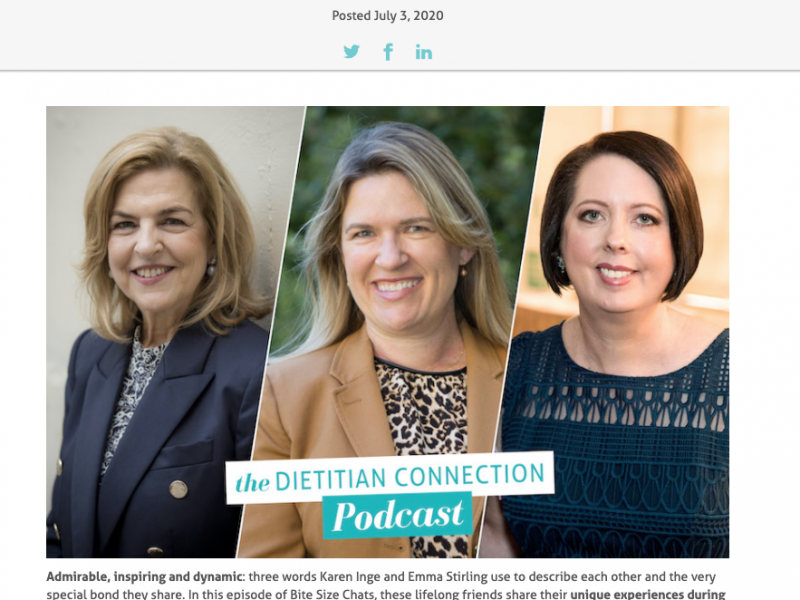One of the best aspects of blogging is being able to bring you nutrition news, very speedily. I’m especially motivated to give you the scoop when I spot a new craze just emerging. So I called on my dietitian friend from New York for help. Believe me this is one post that you’d be crazy not to read:
Jessica Fishman Levinson, MS, RD, CDN is a registered dietitian and the founder of Nutritioulicious™, a private practice and nutrition consulting business in New York. She has extensive experience as a nutrition writer, editor, and speaker, and has been featured as a nutrition expert on television and in magazines, newspapers, and Web sites. Jessica also consults for several food and beverage companies and maintains a popular nutrition blog. You can become a fan of Nutritioulicious on Facebook and follow Jessica’s food and nutrition tweets @JlevinsonRD.
There’s a new fad diet in town and I for one am not a fan. I’ve never supported “diets” (especially ones that are completely unsound) as they are commonly defined – “a limitation on the amount of food you eat in order to lose weight.” To me and other dietitians, the word “diet” is not a four-letter word – it’s simply what you eat on a daily basis. However, fad diets are big business; therefore, it’s no wonder a new one pops up every time people fall off the wagon with an old diet. And often the same diet resurfaces after many years, which is the case with the latest diet trend, the HCG diet.
What is the HCG diet?
HCG is human chorionic gonadotropin, a hormone produced during pregnancy to ensure a fetus gets necessary nutrients. The HCG diet traces back to the 1950s when a British endocrinologist found that small doses of the hormone helped obese patients lose fat when combined with a very low-calorie diet. The endocrinologist surmised that HCG acted as an appetite suppressant and people who took it would not be able to consume more than 500 calories (2000kJ) per day – between one-fourth and one-third of the calories most people require per day.
![yhst-29274815559378_2153_5426797[1]](https://scoopnutrition.com/newversion/wp-content/uploads/2011/04/yhst-29274815559378_2153_54267971-150x150.gif) On the HCG diet people inject themselves with HCG every morning and eat a diet of organic meats, vegetables, fruit, and fish. Dairy, carbohydrates, alcohol, and sugar are all off limits. Because the HCG injections require a prescription from the doctor, some people take HCG droplets (sold online), which are homeopathic and contain only trace amounts of the hormone.
On the HCG diet people inject themselves with HCG every morning and eat a diet of organic meats, vegetables, fruit, and fish. Dairy, carbohydrates, alcohol, and sugar are all off limits. Because the HCG injections require a prescription from the doctor, some people take HCG droplets (sold online), which are homeopathic and contain only trace amounts of the hormone.
It’s not clear why the HCG diet has returned to the scene now, but one thing’s for sure – it has taken off big time in the US. The diet has been written about in newspapers and magazines, and a couple of months ago Dr. Oz showcased the HCG diet on his talk show and discussed what all the hype is about. So why all the fuss about this diet? Advertisements for the HCG diet promise weight loss of a pound (0.5Kg) a day – that’s 30 pounds (14Kg) in a month, well beyond the typical one to two pounds (up to 1kg) a week most dietitians recommend. Who wouldn’t want a quick fix like this if they have a lot of weight to lose?! The problem with quick fixes is that they don’t last.
What does the science say?
Researchers have studied the HCG diet for years and have found no evidence that the hormone itself induces weight loss. The most likely explanation of the rapid weight loss is the highly restrictive diet that is being followed. Whether or not you take HCG, you would lose weight on a 500-calorie diet because it’s impossible to meet your nutritional needs when consuming so little food on a daily basis. And aside from the weight loss results from such a low-calorie diet, you could experience many short-term side effects such as hair loss, headaches, constipation, lethargy, and amenorrhea (in women), and long-term effects including bone and muscle loss, gallstones, and electrolyte imbalances.
While HCG has been approved for prescription use by the U.S. Food and Drug Administration to treat women with fertility issues, this past January the FDA warned that homeopathic HCG (the drops) are fraudulent and illegal when sold for weight-loss. The FDA also requires all HCG products, including the prescribed injections, to carry a warning stating there is no proof that the drug is effective for weight loss, redistributes fat, or decreases hunger.
The Bottom Line
The HCG diet is just another fad diet that leads to rapid weight loss that will be regained as soon as a normal diet is resumed. The healthy weight-loss solution is a balanced diet of no less than 1200 calories per day that includes all foods in moderation, watching portion sizes, and exercising on a regular basis.
Editor’s comment:
Thanks Jessica, that’s a great heads up on the situation in the USA. I’ve heard rumours of people trialling the diet (again) here and I hope my colleagues can help enlighten me on the prescription status with HCG injections? I’m off to investigate further. What about you readers, is there a worse fad than this you’ve tried? I can’t look at a grapefruit and not think about Scarsdale, bad, teen memories (showing my age). What are your horror or hero weight management stories? Love to hear your comments below.




